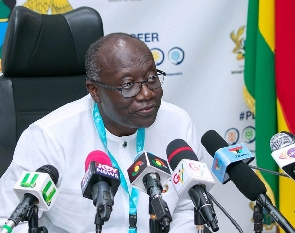 Minister of Finance, Ken Ofori- Atta
Minister of Finance, Ken Ofori- Atta
The Minister of Finance, Ken Ofori-Atta is known for his signature; white apparel, brown bag, and use of scriptures from the good books anytime he addresses the public on the economy.
On such a case over the weekend, the minister, while giving an update on the economy after Ghana received the first trench of $304 million of the $3 billion it requested from the IMF, indicated that the current gains is the doing of the Lord and we must be glad and rejoice in it.
This was contained in a Twitter post by Metro TV.
Ken Ofori-Atta began by expressing appreciation to organizations and institutions who assisted the ministry in implementing some policies and programmes.
“For us in Ghana, we’ve successfully navigated the Debt Exchange Programme (DEP) with steadfastness. My gratitude to the individuals, banks, insurance and capital market sectors for their resolve and the strong intercessory prayers by our faith-based organizations.
“And so fellow Ghanaians as in Psalms 118, let us indeed give thanks to the lord for he is good. For this is the lord’s doing and it is marvellous in our sight,” he said.
Background
The Minister of Finance, Ken Ofori-Atta, is well-known for his signature white apparel, brown leather bags, and for being someone who loves to quote scriptures from the Bible.
Every time he addressed the country on economic matters, he would always throw in a reference to a scripture in the Bible, to support an argument or to conclude his speeches.
The suspicion, as has become common knowledge now, is that with those scriptures, he is sending a signal that his words are the truth, and nothing else.
The most recent of such instances where the minister referred to a Bible scripture in a public address was when he appeared in parliament on February 16, 2023, to present a statement on the government’s Domestic Debt Exchange Programme (DDEP).
As expected of him, he began his presentation with a quotation from the Bible.
“Mr. speaker I come in peace and as expected, if I look at Psalm 105, it says that let’s give thanks and note that we should rejoice with the lord and make his great deeds known to people,” he said, attracting varied reactions from both sides of the house,” he said.
Not too long after that, the minister and some members of his team attended the IMF/World Bank Spring Meeting, where they discussed Ghana’s external debt restructuring, and the modalities and subsequent approval of a $3 million bailout to help Ghana.
Rather surprisingly, the minister was not heard using any of these speech-reading techniques at these international engagements with the IMF and the World Bank leaders.
Throughout the series of meetings with the leaders of the Bretton Wood Institutions, the finance minister has not been heard making references to the scriptures as a negotiating skill to appeal to the emotions of the leaders.
There is a begging question about whether or not the use of Biblical scriptures is just a technique the Minister of Finance, Ken Ofori-Atta, employs within the shores of Ghana only, or whether there is a bigger explanation as to why the same isn't applied in his engagements outside the shores of the country.
What is the power that exists in the use of Biblical scriptures within Ghana, but the same is not used outside the country? What happens to all those well-known, relatable scriptures when Ken Ofori-Atta is engaging with people outside the shores of Ghana?
This is the Lord's doing and it's marvelous in our eyes - Finance minister hints at ambitious agenda for economic reform#MetroNews pic.twitter.com/T45Bnpj364
— Metro TV Ghana (@metrotvgh) June 19, 2023
You can also catch up on the second episode of Everyday People below:
Share your news stories and ideas with GhanaWeb

To advertise with GhanaWeb

You can also watch the latest episode of People & Places here:
NW/WA